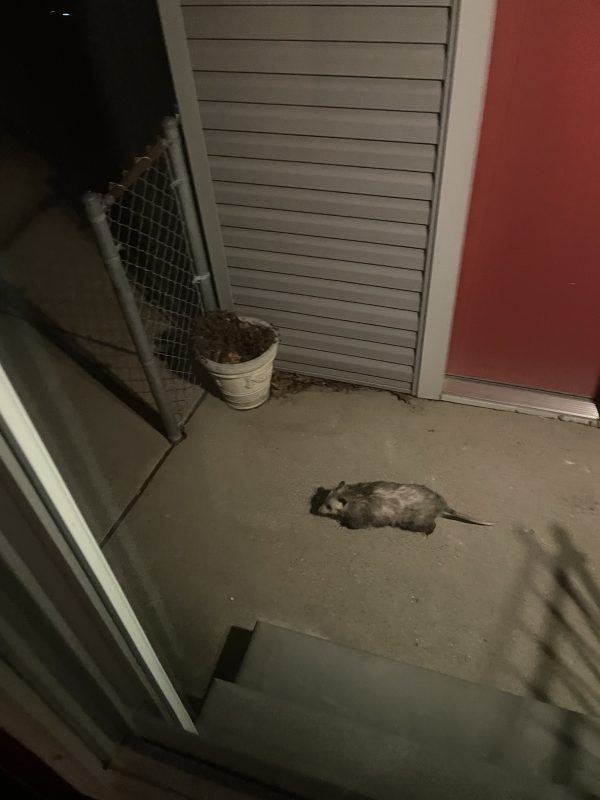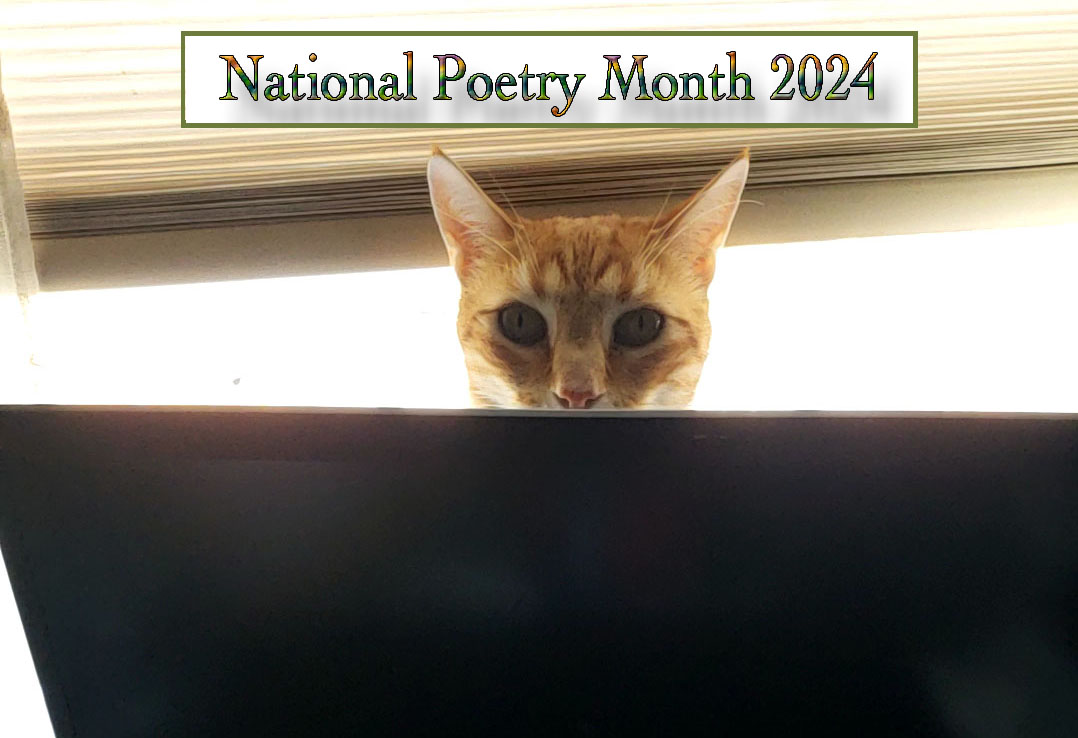Welcome to National Poetry Month and Gyroscope Review’s month-long celebration of poets – and their diverse Writing Assistants. Enjoy the audio/video works by previous Gyroscope Review poets, and be sure to check out the Author and fun Writing Assistant Bio at the end of each National Poetry Month poet post. Don’t forget to tag the poet on Social Media and let them know you enjoyed their work!
Adrian Dantley (AD) Circa 1890s by Cal Freeman
Adrian Dantley (AD) Circa 1890s The night Larry Bird famously stole Isiah Thomas’ inbound pass I was with my mother at Circa 1890s Saloon across Cass Avenue from Wayne State University where my father was teaching The Tempest to a group of bored undergrads in State Hall. It was 1987, or circa 1890 if one takes the long view of history. AD was my favorite Pistons player that year. My mother was bantering with a drunk Boston fan who, as she put it, “was looking to get his teeth knocked out rooting for Boston in a Cass Corridor bar.” My father let his class out early to catch the end of the game. We had them down one with three seconds to go and possession of the ball. It looked like we were coming back to Detroit with a 3-2 series lead and were finally going to vanquish the Celtics. “Larry Bird sucks eggs on Saturday nights,” my mother taunted the guy. It was Tuesday. My parents shared an ’85 Ford Escort back then, and we picked my father up from work Tuesday nights so he didn’t have to ride the Warren Avenue bus after dark. My father laughed at my mother’s trash talking as he sipped his Newcastle Ale. Gone now circa 2020 is Circa 1890s, its façade of curved white pillars that never blocked the rain and faded to the color of cigarette ash as the paint leached and decades passed, known as “the teeth” to Wayne State students, gone. All bars circa 1890s get loud with animated talk about little matters that matter little alone but creep up in aggregate at the end of a stanza. Basketball is a series of meticulous little matters. AD and Bill Laimbeer setting brutal, off-the-ball screens out of bounds. Barroom histrionics around cathode ray tube televisions, full fathom five into which the ghost of Boston Garden stowed our hopes (in the deciding game seven AD would knock himself unconscious diving for a loose ball). Wondrous and strange, my mother’s invective, the beer foam in my father’s beard, Larry Bird stepping before that fated pass like an interference beam (the holomovement that holds them there in their spectral dimensions), his quick toss to Dennis Johnson for a lay-up with a second left. AD dropped 25 in game five. His right leg was two inches shorter than his left, but he had a such a quick first step (Kevin McHale was a wicket jammed in wet cement when he tried to guard him) and a deadly flat-footed shot. Isiah never liked him, though, and Dennis Rodman got too many minutes for his taste. When they traded AD in 1989, I sobbed on my mother’s shoulder in our living room (yellow light on rough-hewn mahogany paneling, all that never happens in the interior of a place happens to us, directly, there. The secret mind of a university swimming in imported tap beer and popcorn, free popcorn. Circa 1890s, a joke that was easy to miss but would define an epoch in a public university’s life) like we were saying goodbye forever to somebody we loved. It’s the first time I remember feeling that way.
Fandango Hall Matchbook as a Non-Fungible Token by Cal Freeman
Fandango Hall Matchbook as a Non-Fungible Token Manilla timecard in the slot to stamp the hour and minute it ostensibly began— that kitchen where Nancy dangled a cigarette in her lips above a vat of soup, precarious simmer. The Fandango Hall matchbook advertised smoke-eaters, signature fried chicken, plenty of well light [sic] parking, and a festive atmosphere that kept the Iron Mustangs Motorcycle Club coming back for their annual party. It’s impossible to explain how gratifying it was to show up first the morning after cabarets and gather blunt roaches from tin ashtrays on the tables, to unroll them and pour the shake into a Ziploc bag from which you’d smoke for days. You might return then to your Buick Century in the parking lot and listen to “Pigs on the Wing” or Jim Carroll reading from “The Narrows” while waiting for Gil Garza, Ben Brown, Jonathan Chapel, the Jenner Brothers. Knowing the day would be stretched out the way dawn gets stretched in a blear of exhaust fumes, you’d have wasted every lovely sentiment that rattled in your head by nine. Seagulls would linger there to scavenge chicken bones, butts, wet napkins smeared with grease. They exercised such indiscriminate hungers. What would you be setting up for in that empty hall? Retirement, nuptials, some other rite with a puzzling diagram of oval tables? One morning you retrieved the numbered ping pong balls from the riser and laughed about the plastic trolls, those amulets the old women had forgotten at Bingo the night before, their neon hair standing against the wicked fates.
WRITING ASSISTANT BIO
My most recent writing friend has been an opossum that passes by the side door periodically during the odd, late hours I draft my poetry. It doesn’t have a name, but I take the presence of opossums as a good sign. I’m told they eat ticks and have no animus toward humans. I’m told by this possum that they lent both George Jones and TS Eliot their nicknames. This opossum has informed me that the rapid senescence they’ve been gifted by evolution has nothing to do with play. A possum isn’t playing possum; a possum doesn’t play. Rapid senescence is so they don’t remember what befalls them; it’s a proleptic device for erasing trauma, for keeping the self intact.

AUTHOR BIO
Cal Freeman is the music editor of The Museum of Americana: A Literary Review and author of the books Fight Songs (Eyewear 2017) and Poolside at the Dearborn Inn (R&R Press 2022). His writing has appeared or is forthcoming in many journals including Image, The Poetry Review, Verse Daily, Under a Warm Green Linden, North American Review, The Moth, Oxford American, River Styx, and Hippocampus. His poems have been anthologized in The Poet’s Quest for God (Eyewear 2016), RESPECT: The Poetry of Detroit Music (Michigan State University Press 2020), I Wanna Be Loved By You: Poems On Marilyn Monroe (Milk & Cake Press 2021), What Things Cost: An Anthology for the People (University Press Kentucky 2022), and Beyond the Frame (Diode Editions 2023). He is a recipient of the Devine Poetry Fellowship (judged by Terrance Hayes), winner of Passages North’s Neutrino Prize, and a finalist for the River Styx International Poetry Prize. Born and raised in Detroit, he teaches at Oakland University and serves as Writer-In-Residence with InsideOut Literary Arts Detroit.
https://www.spdbooks.org/Products/9781737252818/poolside-at-the-dearborn-inn.aspx
Don’t forget to read the Spring 2024 Issue of Gyroscope Review.
NPM 2024 Poets
April 1 – Cal Freeman
